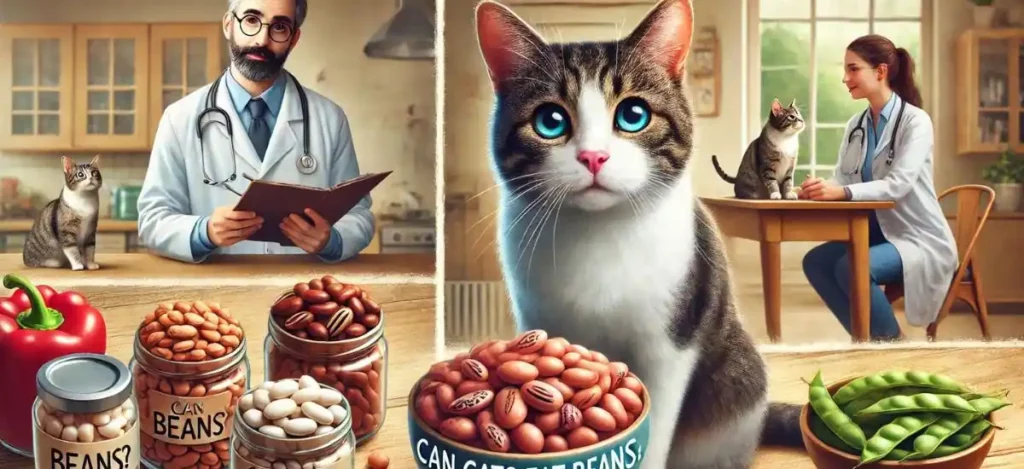Have you ever caught your cat eyeing the beans on your dinner plate and wondered if it’s okay to share a few? Cats are known for their curiosity, not just about their environment but also about our food! While some human foods are perfectly safe for feline consumption, others can be a cause for concern. Today, we’re spilling the beans on whether these protein-packed legumes are fit for your kitty.
What Are Beans?
Beans are a staple in many diets around the globe, valued for their high protein and fiber content. There are many varieties, including black beans, kidney beans, and garbanzo beans (chickpeas), each with its unique taste and nutritional profile. Generally, beans are rich in vitamins like B vitamins, which support cellular health, and minerals such as iron, which is crucial for blood health. However, the question remains: What does this mean for our feline friends?
Can Cats Safely Eat Beans?
When it comes to cats and beans, the answer isn’t black and white. Beans are non-toxic to cats, but that doesn’t mean they’re an ideal snack.
Key considerations include:
- Digestive Issues: Beans are high in fiber, which can be beneficial in small amounts but might lead to digestive upset in cats, who are primarily carnivorous and not well-equipped to process high-fiber foods.
- Nutritional Balance: Cats require a specific balance of nutrients that are best provided by high-quality commercial cat food. While the protein in beans might seem beneficial, it doesn’t provide the complete amino acid profile cats need.
Types of Beans and Their Effects on Cats
When considering beans for your cat, it’s important to differentiate between types, as not all beans are created equal:
- Black Beans: These are rich in antioxidants and protein but should be given in moderation due to their high fiber content which can be hard on a cat’s digestive system.
- Kidney Beans: These must always be cooked thoroughly before offering to your cat, as raw kidney beans contain toxins harmful to both humans and cats.
- Chickpeas (Garbanzo Beans): While chickpeas are a good source of protein and fiber, they can cause gas and stomach upset in cats, similar to humans.
Table: Nutritional Comparison of Different Beans for Cats
| Type of Bean | Protein | Fiber | Potential Risks |
| Black Beans | High | High | Digestive upset |
| Kidney Beans | High | Medium | Toxins if raw |
| Chickpeas | High | High | Gas, upset stomach |
How to Safely Introduce Beans into a Cat’s Diet
Introducing any new food into your cat’s diet should be done with caution and gradually:
- Start Small: Begin with a small amount of cooked, unsalted beans to see how your cat reacts.
- Observe: Keep an eye on your cat for any signs of digestive distress or allergies.
- Increase Gradually: If your cat tolerates beans well, you can gradually increase the amount, but it should never constitute more than a small percentage of their overall diet.
- Consult Your Vet: Always consult with your veterinarian before making significant changes to your cat’s diet to ensure it aligns with their health needs.
Alternatives to Beans for Cats
If you’re looking for safer and potentially more beneficial alternatives to beans for your cat, consider these options:
- Cooked Lean Meats: Such as chicken or turkey, which provide the necessary proteins and are much easier for cats to digest.
- Commercial Cat Treats: Specially formulated to meet the nutritional needs of cats without the risks of digestive issues.
- Small Amounts of Cooked Vegetables: Like pumpkin or carrots, which can provide fiber without the risks associated with beans.
Each of these alternatives provides nutrients that can benefit your cat’s health without the potential risks that come with feeding them beans.
Frequently Asked Questions
Q1. Can cats eat canned beans?
Ans: It’s best to avoid canned beans for cats due to their high sodium content and potential additives that are not suitable for feline consumption.
Q2. How often can cats eat beans?
Ans: Beans should only be offered occasionally and in small quantities as a treat, not as a regular part of a cat’s diet.
Q3. Are beans a good treat for cats?
Ans: While beans are not toxic, there are better treat options that are more in line with a cat’s nutritional needs and digestive capabilities.
Conclusion
While beans are a nutritious part of the human diet, they are not ideal for cats. Cats are obligate carnivores, which means their bodies are designed to digest and use nutrients from animal sources more efficiently than plant sources. Introducing beans into a cat’s diet should be done cautiously if at all, and should never replace a portion of their regular, meat-based diet. If you’re looking to diversify your cat’s diet or introduce new treats, consider safer alternatives that align more closely with their nutritional requirements. Always consult your vet before introducing new foods to ensure they fit well with your cat’s specific health needs.

